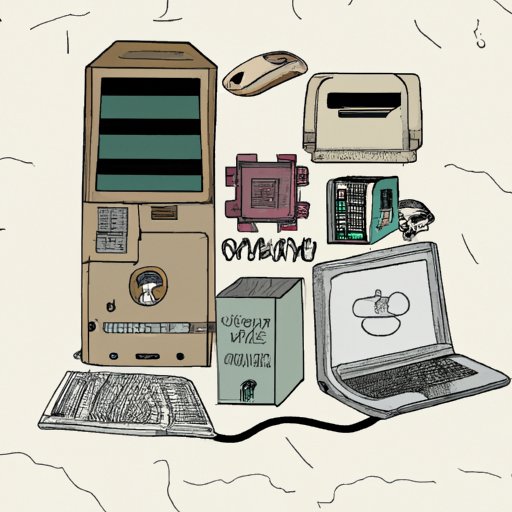Introduction
A computer is an electronic device that receives input, stores and processes data, and provides output in a useful format. The invention of the computer has had a profound impact on society, changing the way we communicate, work, and live. In this article, we will explore the history of the invention of the computer, as well as the people, technology, and timeline that led to its development.

Historical Overview of the Invention of the Computer
The concept of a computing device has been around since ancient times. Early attempts at creating a computer-like device include the abacus, which dates back to the 2nd century BCE. Mechanical calculators were developed in the 17th century and continued to evolve over the years. But it wasn’t until the mid-20th century that computers began to look like the ones we know today.
In the 1940s, computers began transitioning from mechanical devices to electronic machines. This transition was made possible by advances in technology, such as the development of transistors and integrated circuits. Memory devices and programming languages also played an important role in the evolution of computers.
How Advances in Technology Led to the Invention of the Computer
Transistors, which are semiconductor devices used to amplify or switch electrical signals, were invented in 1947. This invention enabled the miniaturization of computers and allowed them to become more reliable and powerful. In 1958, Jack Kilby and Robert Noyce developed the first integrated circuit, which further increased the power and efficiency of computers.
Memory devices, such as magnetic core memory, were also instrumental in the development of computers. These devices allowed computers to store large amounts of data and instructions. Programming languages, such as FORTRAN and COBOL, made it easier for humans to interact with computers and gave rise to the development of software applications.

A Timeline of Events Surrounding the Invention of the Computer
1936: Alan Turing publishes his paper “On Computable Numbers”, which introduces the idea of a universal machine capable of performing any computation.
1943: John Atanasoff and Clifford Berry build the Atanasoff–Berry Computer, the first electronic digital computer.
1946: The Electronic Numerical Integrator and Computer (ENIAC) is completed, marking the beginning of the modern era of computing.
1947: Transistors are invented, revolutionizing the field of computing.
1949: Maurice Wilkes develops the first stored program computer known as the EDSAC.
1951: UNIVAC I, the first commercial computer, is released.
1958: Jack Kilby and Robert Noyce develop the first integrated circuit.
1959: The first successful high-level programming language, FORTRAN, is released.

Exploring the Innovators Who Pioneered the Invention of the Computer
Charles Babbage is widely considered to be the father of modern computing. He designed the Difference Engine, a mechanical calculator capable of executing basic arithmetic operations. His designs laid the groundwork for later computers.
Alan Turing is credited with introducing the idea of a universal machine that could perform any computation. His paper “On Computable Numbers” laid the foundations for modern computing.
John von Neumann is credited with developing the stored program concept, which allowed computers to store instructions and data in the same memory. This concept would later become the basis for modern computing.
Examining the Impact of the Computer on Society
Since the invention of the computer, our lives have been drastically changed in many ways. Computers have revolutionized the way we work, learn, and communicate. They have increased productivity and efficiency in industry, education, and communication.
Computers have also enabled us to access vast amounts of information and data, allowing us to make better decisions and solve complex problems. In addition, they have enabled us to create new products and services, as well as to explore and understand the world in ways that were previously impossible.
Conclusion
The invention of the computer has had a profound effect on modern life. From its early beginnings in mechanical devices to its current electronic form, the computer has transformed the way we communicate, work, and live. The pioneers who contributed to the invention of the computer, as well as the advances in technology that enabled its development, have shaped the world we live in today.
(Note: Is this article not meeting your expectations? Do you have knowledge or insights to share? Unlock new opportunities and expand your reach by joining our authors team. Click Registration to join us and share your expertise with our readers.)
